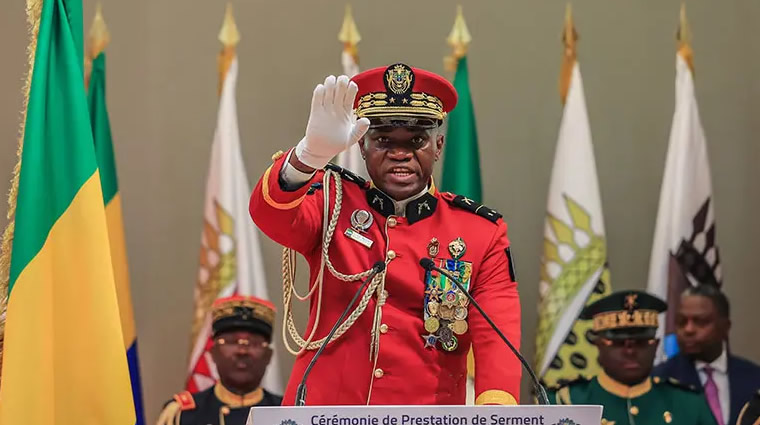General Brice Oligui Nguema, who led a coup last week that toppled Gabon’s 55-year-old dynasty, took the oath of office as interim president on Monday, promising to hold “free… (and) transparent elections” after an unspecified period.
Oligui, head of the elite Republican Guard, led officers in a coup on Wednesday against President Ali Bongo Ondimba, scion of a family that had ruled since 1967.
The ousting came just moments after Bongo, 64, was proclaimed victor in last month’s presidential election — a result branded a fraud by the opposition.
“I swear before God and the Gabonese people to faithfully preserve the republican regime,” said Oligui.
Dressed in the red ceremonial costume of the Republican Guard, Oligui also swore to “preserve the achievements of democracy”, at the ceremony held before judges of the Constitutional Court.
He immediately pledged in a speech to hold “free… (and) transparent elections” after a transition period which he did not specify, and to amnesty “prisoners of conscience.”
Elections Promised
The coup leaders on Wednesday said they had dissolved the nation’s institutions, cancelled the election results and temporarily closed the borders.
Other countries have not acknowledged Oligui as Gabon’s legitimate leader and he faces pressure to spell out his plans for restoring civilian rule.
Oligui was lifted up triumphantly by his troops following the announcement of the coup, and in the days since has been seen flanked by generals and colonels.
He has also held hours of high-profile discussions with business and religious leaders, unions, political parties, NGOs, diplomats, and journalists, and has been taking notes and responding at length to questions and grievances.
On Friday, he vowed to create more democratic institutions that respect human rights, but said he would proceed “without haste”.
A fringe of the former opposition is urging Oligui to hand over power, but many people in Gabon seem happy about the overthrow of the Bongo dynasty, with celebrations in the streets of the capital Libreville and the economic hub of Port-Gentil.
Several Western countries and organisations have condemned the coup while acknowledging that it is different to others on the continent due to concerns over the credibility of the vote itself.
“Naturally, military coups are not the solution, but we must not forget that in Gabon there had been elections full of irregularities,” said the European Union’s foreign policy chief Josep Borrell.
‘Make Noise’
Former president Bongo had been seeking his third term in office after coming to power in 2009 following the death of his father Omar, who ruled Gabon with an iron fist for over 40 years.
The coup leaders said they had put him under house arrest and placed him “in retirement”.
But Bongo managed to distribute a video on social media where he said his son and wife Sylvia had been detained, appealing to “all friends that we have all over the world… to make noise” on his behalf.
National TV on Friday showed rolling images of the deposed president’s son Noureddin Bongo Valentin and other arrested officials in front of suitcases filled with cash allegedly seized from their homes.
The military has accused them of treason, embezzlement, corruption and falsifying the president’s signature, among other allegations.
Five other countries in Africa — Mali, Guinea, Sudan, Burkina Faso and Niger — have undergone coups in the last three years. Their new rulers have resisted demands for a short timetable for returning to barracks.
AFP








More Stories
Teenager in viral photo of Obi’s 2023 presidential campaign rally, Alabi Quadri languishes in jail
Ribadu tells families of kidnapped victims not to pay any ransom
Ndume tackles Tinubu over massive borrowings, lists ‘spurious’ items